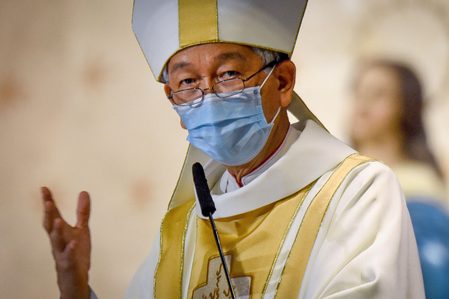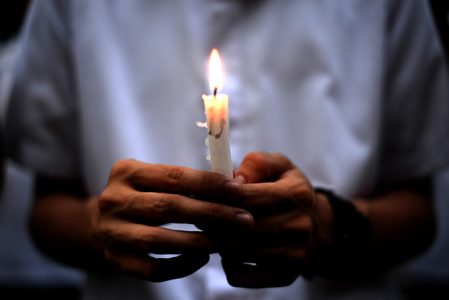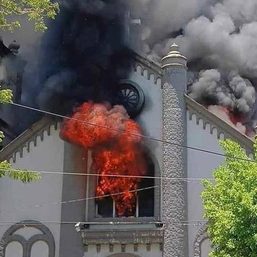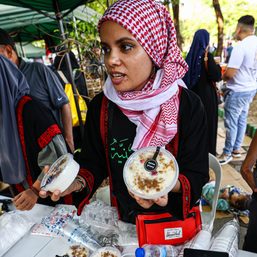SUMMARY
This is AI generated summarization, which may have errors. For context, always refer to the full article.
![[OPINION] Standing with Bishops Pabillo and David](https://www.rappler.com/tachyon/2021/03/tl-pabillo-david-iatf-sq.jpg)
One would think that, by Christian standards, Manila Archdiocese Bishop Broderick Pabillo’s riposte to the Inter-Agency Task Force’s (IATF) ban on religious congregational activities is uncharacteristically harsh of a servant of the Prince of Peace, who presently administers the office once held by the equally beloved Luis Cardinal Tagle.
“May God have mercy on your souls.”
The uninitiated may believe this to be one step below, if not practically, “Bahala na ang Diyos sa inyo.”
Bishop Pabillo is being uncharacteristically harsh, because the IATF’s guidelines prohibiting Masses and other congregant celebrations, except weddings, baptisms, and funerals with up to 10 people, is uncharacteristically harsh. We ask, and not only as Catholics and believers, but also secularly, without invoking God’s name here: by what scientific, rational, and/or rightful basis did the IATF come up with banning all public worship?
Bishop Ambo David, of the Diocese of Caloocan, has also protested the government decisions, posting in all capital letters his disagreement: ““IN SPITE OF OUR ADHERENCE TO STRICT PROTOCOL YOU LOCK DOWN OUR CHURCHES DURING THE HOLIEST TIME OF THE YEAR AND ALLOW 70 PERCENT CAPACITY IN FITNESS CENTERS AND 50 PERCENT IN ESTABLISHMENTS FOR PERSONAL CARE SERVICES, INCLUDING SPAS?!!! ALL RIGHT. MAY GOD HAVE MERCY ON YOUR SOULS!”
Back to zero
We have been here before. Only 10 people were allowed to attend Mass at any given time back in the middle of 2020, when the Metro was set to ease restrictions from enhanced quarantine to general quarantine. Even then it was blasted as ridiculous, given that other public establishments allowed to open were given percentage capacity allowances — even if such establishments would pack their patrons closer together. Not only freedom of worship but equal protection was at stake then, mirroring similar issues in the United States where religious congregational celebrations were given tighter restrictions than equivalent commercial establishments.
Some attack dogs have arisen to slam the good Bishops and/or the Church, to paraphrase, for demanding in Christian obedience that health guidelines be flouted, that we supposedly ignore the harsh reality of COVID-19. Official outlets say the same in polite, if pointed, terms.
Evidence shows that not only is the Church not doing any such thing, more often than not it had taken the initiative, if not the lead, in following protocols. Certainly they had followed health developments from the very start, with dioceses suspending Masses when the government first announced Metro Manila entering lockdown back in March 2020.
And as the country dithered deeper into the pandemic, parishes evolved ceremonies and observances to incorporate social distancing, physical masking, and disinfection. They also took advantage of digital media to maintain reach while keeping distance, and exhorted and guided the faithful in our Undas and Simbang Gabi rituals to keep them COVID-safe.
Bishop Pabillo’s latest Pastoral Instruction, We Worship the Lord, is no call for rebellion: it repeats similar, if not the same, instructions, guidelines, and best practices the Archdiocese had announced, practiced, and evolved over the past pandemic year – practices similar to other establishments’ to allow life to breathe – spiritual and material life alike – while maintaining safety.
Science-based options
Was it an act of desperation that led the IATF to make a blanket ban? We go back to the science of how COVID spreads: proximity, lack of physical barriers or filtering, lack of adequate ventilation or air circulation, and failing to account for contact tracing and symptoms tracing. The Pastoral Instruction, and all the past guidelines and practices informing it – the 10% capacity, contact tracing, online options, all the health protocols – accounts for these factors.
It would be easier, in fact, to do contact tracing and health protocols in church, with its regular and regimented attendance, than in commercial establishments or public hubs like transportation stations, where the attendance is less predictable, and in some instances, where the crowd control is less effective.
The point is, by fact the Church is the last institution nowadays that would make their congregations breeding grounds for the pandemic. Especially considering Pope Francis’ own example. Especially considering Church initiatives to keep the faith in the face of the pandemic’s reality. Especially considering where churches have offered their good offices in everything from contact tracing to vaccination promotion.
All she asks for is the ability to worship within reasonable boundaries and restrictions, for the sake of those who need a light when the darkness descends. For of all the possessions of an individual in this world, their conscience, their faith, and all their choices are the most precious of them all.
Against the inviolability of the believer’s conscience, though, the IATF can invoke governmental interest, as we imagine it would. Not even the Church nor we would deny that public health is a state interest compelling enough to invoke the power to regulate. Yet the country’s highest laws never intended the State to wield a sledgehammer to regulate public life, or even save it. Law circumscribes power, even in emergencies, by justified necessity — and the justification of means.
Not only Bishops Pabillo and David, in response to the recent restrictions, but many others on other subjects besides, can be uncharacteristically harsh when power makes the resort to sledgehammers a habit.
Contrary to the pasaway dismissals of some personalities, many Filipinos have been shown, to the best of their ability, to have followed IATF regulations, despite poverty, despite hunger, despite growing helplessness and hopelessness. Filipinos abroad even dutifully follow their host state’s restrictions.
And yet Filipinos also see the rich or powerful flout those same regulations that have made them poorer, hungrier, helpless. Filipinos see rising cases despite all their efforts. Slips and slip-ups in vaccination plans, questions about where all the emergency powers have been used, where the emergency money has gone. And the State’s response is another blunt and heavy instrument, in the name of “circuit-breaking,” even as it claims the economy is still open.
A reasonable request by the Church
The Church is not asking for much, and it certainly is not asking for rebellion. She only asks that the State remembers that a people’s morale, where it is motivated by faith, is as important to their health. She asks the State to consider the efforts of her priests and acolytes in controlling COVID’s spread, instead of dismissing their efforts outright. And for all of the criticisms hurled against the Church in recent times, even including the valid ones, for all of her shortcomings, the Church and her people have grown into looking out for the welfare and liberty of peoples, even non-believers, serving both as the State’s harshest critic, but also its stalwart citizens. She asks for both sides of the free exercise of faith coin: belief and action. And she recognizes the right of the State to regulate action, but asks, like any citizen, for reasonable means, no oppression, and alternatives less intrusive.
And to ask for the right to be as we believe is no rebellion, especially when one observes best practices, guided by the best scientific evidence available, and exercising all prudence throughout, as has been done for a year now. Not only is Bishop Pabillo within his rights, he speaks for the people who are seeing their lives slowly eroding while countries similar to theirs have found ways to bring the plague under control. He speaks for the people who are seeing March 2020 repeat itself.
As believers and as citizens, we ask, not merely for the freedom to worship (nor do we ask in order to recklessly believe), but for sensitivity, consultation, cooperation, and participation in controlling COVID-19. Not to be made mere chess pieces on the board, not to be reduced to statistics and consequences thereof. Everyone has been asking for that for a year. The prophet Nathan knocks on the doors of the palace of the kings. He only asks that the cry in the wilderness be heard. – Rappler.com
Tony La Viña teaches law and is former dean of the Ateneo School of Government.
Christian Laluna is a graduate of the Ateneo Law School. He is writing a book with La Viña on the Bill of Rights during the pandemic.
Add a comment
How does this make you feel?





![[Time Trowel] Evolution and the sneakiness of COVID](https://www.rappler.com/tachyon/2024/02/tl-evolution-covid.jpg?resize=257%2C257&crop=455px%2C0px%2C1080px%2C1080px)


![[OPINION] Stop getting owned by Apollo Quiboloy](https://www.rappler.com/tachyon/2024/04/tl-stop-getting-owned-by-quiboloy.jpg?resize=257%2C257&crop=271px%2C0px%2C719px%2C720px)
![[OPINION] On divorce and Filipino values](https://www.rappler.com/tachyon/2024/04/divorce-filipino-values-april-24-2024.jpg?resize=257%2C257&crop_strategy=attention)

![[Judgment Call] Is Rappler an ‘enabler’ of Catholic ‘copycats’?](https://www.rappler.com/tachyon/2024/04/catholics-copycats-april-18-2024.jpg?resize=257%2C257&crop=418px%2C0px%2C1080px%2C1080px)



![[Newsstand] The Marcoses’ three-body problem](https://www.rappler.com/tachyon/2024/04/tl-marcoses-3-body-problem.jpg?resize=257%2C257&crop=451px%2C0px%2C1080px%2C1080px)
![[Edgewise] Preface to ‘A Fortunate Country,’ a social idealist novel](https://www.rappler.com/tachyon/2024/02/a-fortunate-country-february-8-2024.jpg?resize=257%2C257&crop_strategy=attention)
![[New School] When barangays lose their purpose](https://www.rappler.com/tachyon/2024/02/new-school-barangay.jpg?resize=257%2C257&crop=414px%2C0px%2C1080px%2C1080px)
There are no comments yet. Add your comment to start the conversation.